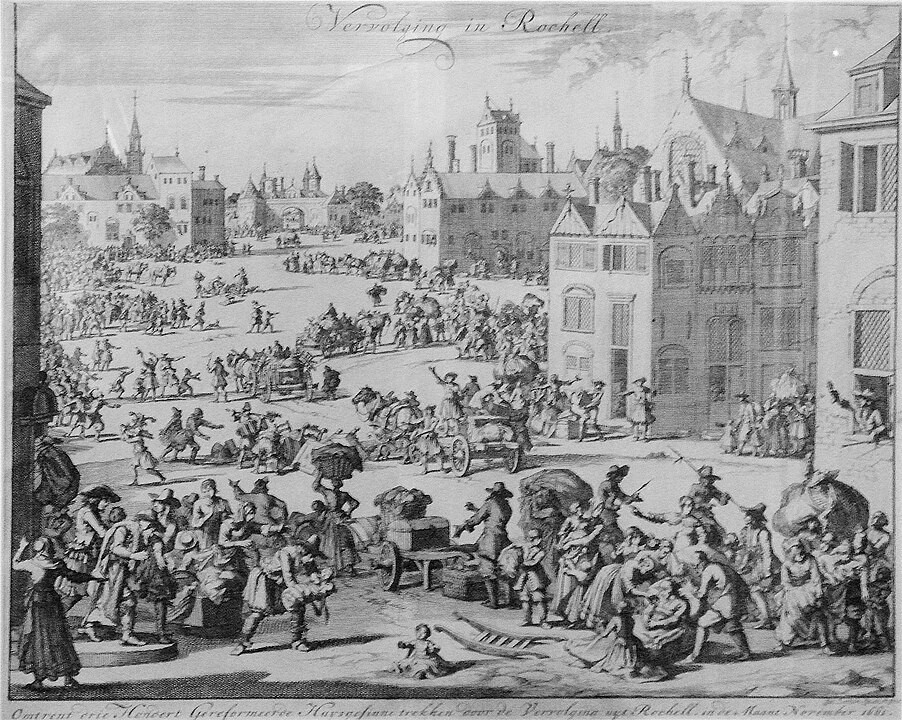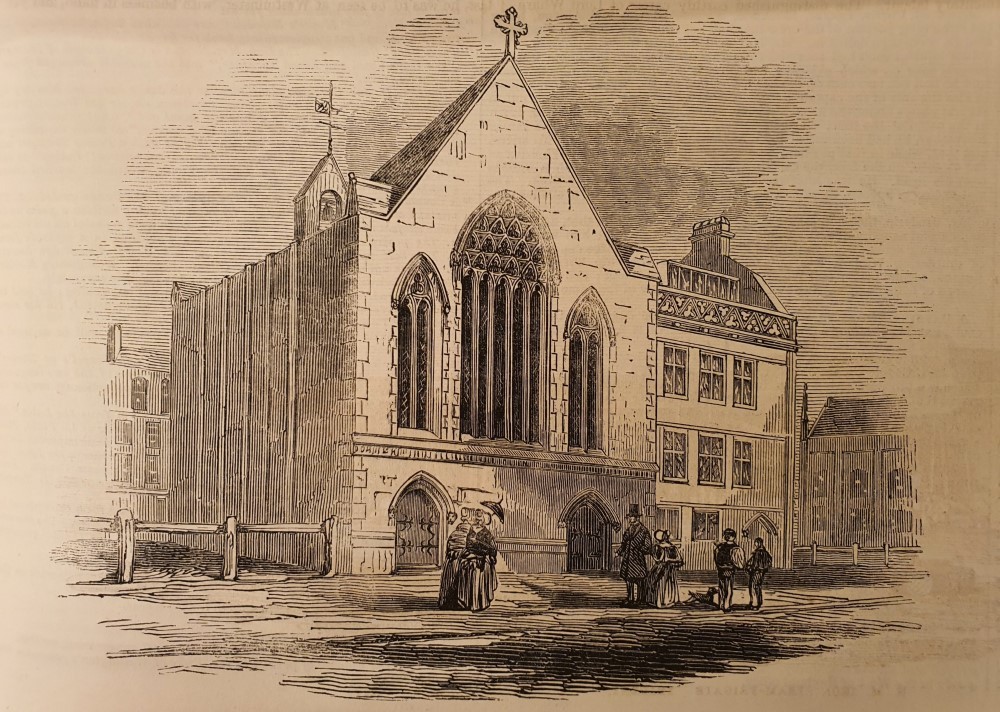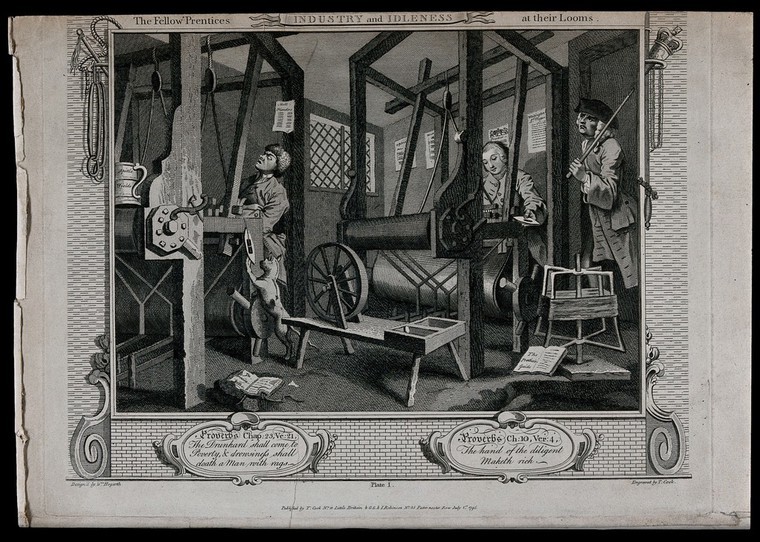Discovering Huguenot ancestry
By Kirsten Perris, Library Technician, Library and Client Services | 17 September 2023
Do you have a French-speaking ancestor? Maybe your family history includes a Huguenot ancestor. When tracing your family history you can often reach a place where the path divides and you need to work out which way you should go. Such as was your French speaking ancestor a Huguenot or did they come from a French-speaking country?

Emigration of the Huguenots 1566 by Jan Antoon Neuhuys
Jan Antoon Neuhuys, Public domain, via Wikimedia Commons
Who were the Huguenots?
The term ‘Huguenot’ was first used in 1560. The origin of the name is uncertain, but it was used to refer to the protestants or Calvinists of France, a Catholic country. Huguenots had been subjected to various levels of persecution before Henry Navarre became king of France. Henry – himself a former protestant who had recanted to appease his overwhelmingly Roman Catholic subjects – issued the Edict of Nantes in 1658, which provided Huguenots with some degree of protection. However, in 1685 his successor, Louis XIV, revoked the Edict of Nantes unleashing brutal persecution of the Huguenots. The result was that from the 1680s to around 1750 hundreds of thousands were forced to flee as religious refugees to England, Ireland, other European countries, the American colonies, and Africa.
It is estimated that 20%-30% of the English population could have Huguenot ancestry. Over the years many may have migrated to Australia. Huguenots tended to settle in clusters in England where they established their own churches, such as at London, Canterbury, Norfolk, and Southampton. They were perhaps understandably slow to assimilate into English mainstream society given language and cultural differences.
There was great disparity in the wealth of the immigrants. A minority had great wealth. This fact was welcomed by their English hosts because their wealth was not tied up in land and property and could be readily invested in industry. However, most Huguenot refugees were very poor. Mainly they were skilled artisans, particularly in trades associated with cloth manufacture, such as weavers and dyers. Their skills helped make England a very wealthy nation during the Industrial Revolution.

Expulsion from La Rochelle of 300 Protestant families, November 1661, by Jan Luyken (1649-1712).
World Imaging, CC BY-SA 3.0, via Wikimedia Commons.
A Huguenot in the family?
So, how do you know whether you have Huguenots in your family tree?
General signs include:
- a French-sounding name, for example you may have an ancestor with a name like “Emma de Leuty".
- a family tradition of a French connection, possibly aristocratic.
- Anglican or non-conformist religious affiliation.
- a connection to known Huguenot trades.
While the above factors are possible indicators of Huguenot ancestry, the most important requirement is that you must be able to trace your family origins back to 17th Century France. For example, a Protestant ancestor with a French sounding name may have originated from another French-speaking country such as Switzerland rather than fled France due to persecution.
How to begin your research
Researching Huguenot family history is slightly different from general family history research. When you start researching family history the emphasis is on the importance of working systematically back from the present day to earlier generations. This is to avoid heading off in the wrong direction.
With Huguenot research you will need to:
- Work back as far as possible through Australian records particularly birth, death and marriage records, as well as shipping records.
- Continue working back through English records such as:
- Civil registration records, 1837 onwards
- Census records (1841 onwards)
- International Genealogical Index (or IGI) and other early parish records
- Contact the Huguenot Society (U.K. and/or Australia) to verify a Huguenot name. If confirmed, you then start to
- work forwards using English Huguenot records to establish links to lesser-known generations.

New French Protestant Episcopal Church, Bllomsbury, Illustrated London News, 27 December 1845, p.405
Huguenot records of England
The main source of Huguenot records in England is the Huguenot Society of Great Britain and Ireland, who have been compiling and publishing records for over 130 years.
Their publications include:
- Proceedings of the Huguenot Society (an annual journal) 1885-. State Library holds Volume 4 only, which covers 1891-1893.
- Huguenot Families – 20 issues published between 1999 and 2009. Nos. 1-10 are held on CD-ROM at State Library.
- Quarto series – Translations and transcripts of original source records of the French-speaking Protestant community in England, compiled by The Society and published in 61 volumes since 1887. There is a partial surname index to the Quarto series covering volumes 1 to 40 and 41-59. Most of the Quarto series and the surname index are held on CD-ROM, microfiche or in print at State Library.
While the first two titles are the product of individual research, the Quarto series includes original records, often written in French.
Additional sources for Huguenot information in England
- International Genealogical Index (IGI). This is an index of hundreds of millions of vital church records. It was created between 1973 and 2012 with half of the entries being contributed by members of the Church of Jesus Christ of the Latter-day Saints, and half were indexed from church records. Details are not always accurate, so you will need to verify any information found. Available on microfiche, CD-ROM and via FamilySearch.
- Anglican Church records, and other non-Catholic denominations. Huguenots often became part of the non-conformist community in England such as Baptists and Methodists.
- English wills, which are a major source of information on the wealthier Huguenot families who fled to England.
- Published Huguenot histories such as Margary Weiner’s The French Exiles, 1789-1815 and The Hidden Thread: Huguenot families in Australia by Robert Nash, both are held at State Library.
- Locality specific archives. Once you can establish a place where your ancestor may have lived you can start researching archives in specific area. For example, if you were looking at London you could try resources such as City of London burials, 1813 –1853 or the free online database London Lives, 1690-1800.
- Apprenticeship records. Huguenots were well-known as artisans of all sorts and apprenticeship records can place individuals in a particular place at a particular time. They will often provide the names of parents/guardians as well as masters.
You will find more information on additional resources, London specific records and apprenticeships records in our research guide “Tracing Huguenot heritage”.

In a Spitalfields silk weaver's shop two contrasting apprentices, Tom Idle, asleep, and Francis Goodchild, engrossed in his work, sit at their looms overseen by their master. Engraving by Thomas Cook after William Hogarth, 1749. Wellcome Collection
Huguenot Society of Australia
If you are uncertain whether your ancestors might have been Huguenots it is a good idea to contact the Huguenot Society of Australia, founded in 2001 and based in New South Wales. They have a list of known Huguenot surnames that came to Australia on their website and will provide advice on the first steps to take in your research.
Since 2003 they have published a twice-yearly newsletter Huguenot Times which includes the results of members’ research. The contents of each issue are listed on their website. Members’ only access is provided to research resources. There is also the Queensland Chapter of the Society, which meets regularly in Brisbane at the Toowong Library. For more information check the Contact page.
Name variants
As with all family history searching looking for name variants is very important. Prior to about 1755 there was no standardised English spelling. Therefore, when scribes were recording unfamiliar names that they heard such as French family names it is inevitable that numerous variations of a name will occur. The variant names can be quite different from the original name. Many names were anglicised, translated, or recorded as heard, for example ‘Le Blanc’ could be recorded as ‘Blong’ or ‘White’. Also, names may be listed with or without the prefixes such as ‘De’, ‘De La’, ‘Du’, ‘Le’ or ‘La’ and may be listed under any part of the prefix. So, when searching for Huguenot ancestors be very flexible in the spelling of the surname you are looking for.
Example: the family name Jonquay also appears as Junquay, John Quay, Quay, Janquay, Jounquay, Jonquet, Junkaway and Junkway in various records.
Resources
- Family history research guide “Tracing Huguenot heritage”: includes a select bibliography of resources held in State Library’s collection.
- State Library Webinar 2023: French Huguenot ancestry and Australia
More information
Family history - /collections/family-history
Ask a Librarian - /services/ask-librarian
One Search catalogue - https://onesearch.slq.qld.gov.au/
Comments
Your email address will not be published.
We welcome relevant, respectful comments.